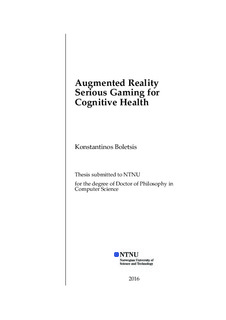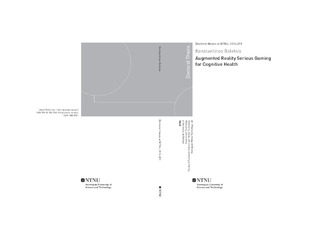| dc.description.abstract | Cognitive impairment in the elderly can be associated with the normal ageing processes or be a symptom of early onset dementia. Even though, early detection of dementia has many benefits, cognitive impairment is still underrecognised and under-diagnosed. This lack of diagnosis often leads to confusion over behavioural changes and prevents social and medical intervention and planning. Cognitive screening represents the initial step in a process of further assessment for cognitive impairment, leading to early diagnosis; however, it presents certain intrinsic limitations. These include culture, gender, and educational biases, long test-retest periods, “white coat” and learning effects, limited test validation and the user’s potential lack of motivation. Serious games can address those limitations and be an alternative to traditional, pen-and-paper and computerised cognitive screening tests, potentially motivating and engaging the user to regularly perform cognitive screening tasks, thus increasing the potential to recognise cognitive impairment and trigger referral for a more comprehensive, formal assessment. The current work contributes by designing, implementing, and testing a novel, gaming approach for the cognitive screening process, utilising stimulating cognitive training. The study thoroughly describes all the design and development stages of a serious game for cognitive training and screening from its inception and its theoretical groundings to its Release Candidate version and the evaluation of its test validity, focusing on the iterative design process and the evaluation of each stage. Finally, a cognitive training game for cognitive health screening of the elderly is produced, utilising an interaction technique based on Augmented Reality (AR) and the manipulation of tangible, physical objects (cubes). The game succeeds in stimulating the cognitive function of the elderly players, presenting high concurrent validity versus the widely used Montreal Cognitive Assessment (MoCA) score. Directions for future research in the area include the use of wearable biosensors - such as smartwatches - for cognitive health screening purposes, suggesting an ecosystem with serious games in the centre. The term “cognitive passport” is defined and discussed, as a tool for tracking personal cognitive health. | nb_NO |

